Interview with Bloodhound Writer Dan Jolley
Welcome to the Jolleyverse! Enjoy an interview with Dan Jolley, creator of Travis Clevenger, the protagonist of
Bloodhound: Crowbar Medicine. Find out more about Bloodhound and Dan's other creations, including his upcoming
Terminator: Enemy of My Enemy mini-series and how he worked on the story for
Prototype 2.
Me: Bloodhound was originally a series that ended with issue 16. Why did you decide to continue Bloodhound in your latest mini-series, Bloodhound: Crowbar Medicine?
Dan Jolley: Well, it would've been nice if the original series had run to issue 16, but it actually got cancelled at issue 10. I had already written the scripts up through issue 12, and had planned a pretty solid wrap-up; the handwriting was already on the wall, so to speak, and we didn't think we'd make it to 13. But then word came down that issue 10 was going to be the last one, and I had a choice: deal with the end of the current storyline and cut off the whole series abruptly, or short-change the current storyline so I could tie up the series as a whole. I chose to continue with the story arc I was working on, and I was happy with the way that turned out, but the series itself just kind of stopped.
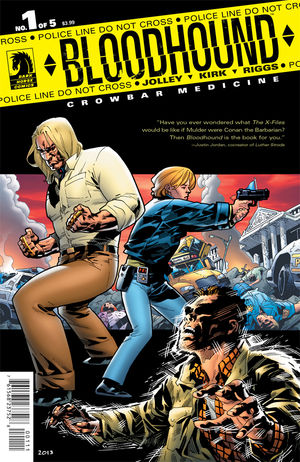
So the easiest answer to why I decided to continue the title with
Crowbar Medicine is simply that the story wasn't done. I had more ideas for Clev and Saffron then, just as I'll have more for them when the current mini ends. It'll be quite a few years before I'm ready to put these characters away. If ever.
Me: Can you talk a bit about the original Bloodhound and what you need to know about that series to fully understand this mini-series?
Jolley: Bloodhound is set in a world where superhumans exist, and where very few of the people who gain superhuman abilities turn out well. That was a line in the pitch document: There are no heroes. It stars a guy named Travis Clevenger—"Clev" to his friends—who doesn't have any superhuman abilities himself, but excels at profiling, tracking down, and beating the living shit out of superhuman criminals. Clev started out as a cop in Atlanta, but he screwed up his personal life to an extraordinary degree, first by having a long-standing affair with his partner Vince Crosby's wife Trish, then by killing Vince in a fight and going to prison. So the story really gets started when the FBI, in the form of Special Agent Saffron Bell, getting Clev out of prison to help the Bureau catch a superhuman rapist/murderer who's targeting the daughter of Clev's dead partner. When that works out pretty well, they decide to keep him out of prison, and on a short leash, as it were.
Originally
Bloodhound took place in the DC Universe, but occupying its own small, dark corner; I stated from the project's inception that I didn't want to tell stories about people with capes and codenames. I was much more interested in exploring what ordinary people would do if they suddenly gained superhuman strength or discovered they could walk through walls. Now
Bloodhound is being published by Dark Horse, and while it's set in the Dark Horse superhero universe now, it's still occupying its own small, dark corner. Clev is still considered an asset by the FBI, he still works with Saffron—who's become more like a partner now, rather than just his "handler"—and he's still forced to wear a humiliating tracking collar around his neck so the Bureau always knows where he is.
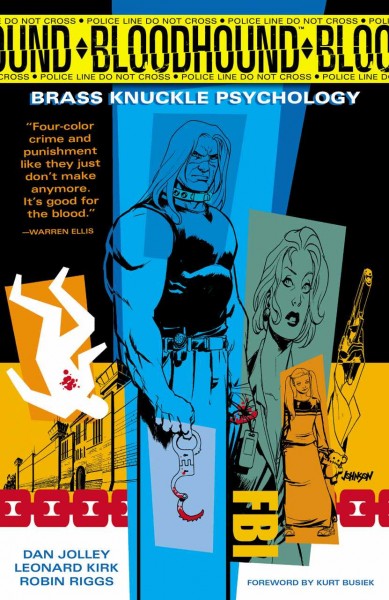
One important element from the original series, which is getting more of the spotlight in the new mini, is Clev's relationship with Trish Crosby. It's kind of a twisted family dynamic, but Trish is still in love with Clev; now she wants him to be a part of her life, and to bond with her two daughters, Rachel, 15, and Michelle, 9. Especially because Michelle is actually Clev's—a fact that Vince discovered, and which was one of the factors that led to the confrontation in which Clev killed him. Clev thinks this is a horrible idea, and tells Trish so, but she wears him down, and when Crowbar Medicine begins, he's actually becoming a part of something that's sort of like family life.
Me: How would you describe your creation and the protagonist of Bloodhound: Crowbar Medicine, Travis Clevenger?
Jolley: Clev is painfully aware of how thoroughly he trashed his life when he was partners with Vince Crosby. The two of them had gotten involved in some serious corruption, and when Clev shot Vince (after Vince savagely slashed Clev's face with a crowbar, leaving the huge scar that runs under Clev's eyes), he just considered himself done. Done with his career, done with life. Clev is big enough and brutal enough that no one messed with him much in prison, and he learned to be comfortable there. He's believed for years now that the world is better off without him in it, and thinks of himself as the lesser of two evils, at best.
Because Clev would be happiest if he were simply left alone, he's in no hurry to ingratiate himself with anyone once the FBI gets him out of prison. One of the hallmarks of his character is his profound lack of respect for the rest of the human race. For quite a while, the lone exception to that was Saffron Bell—Clev actually thinks the world of her, though he wouldn't say so to her face—and everyone else can go hang. He's also an extremely good judge of character, able to size up virtually anyone with little more than a glance, and one of the things he enjoys most is catching people flat-footed with some kind of pointed observation about them or something they've done in the past. For example, right after he got out of prison the first time, Clev met Saffron's boss, a weaselly little guy named Frank Kogney. Clev looked Kogney up and down and said, "Kogney...that name sounds familiar. You're the one who wet your pants in that firefight, right? When you were a cop?" And from the look on Kogney's face, you can tell Clev's right, even though he denies it. Once Kogney had stormed off, Saffron asked Clev how he knew that, and Clev said, "Oh, I didn't know. That was pure guesswork. But he walks like a cop. And he looks the type to wet his pants."
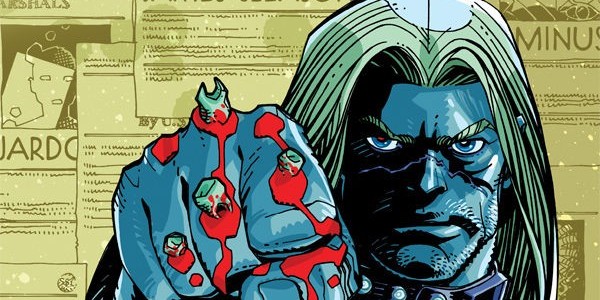
Now, despite himself, Clev is getting truly attached to Trish and Rachel and Michelle—especially Michelle. He's still a huge, scarred, brute of a guy, and he still has to wear the tracking collar, so it's kind of a jarring sight, seeing him interact with what might be considered a normal family. But he's getting there.
The central conflict in Crowbar Medicine results from a superhuman who loses control of his powers and kills two dozen civilians, many of them children, in an Atlanta suburb. A scientist named Bradley Morgenstern decides that the average American can no longer protect himself; Morgenstern has developed a device he calls the Power Chip, which can grant people superhuman abilities. Morgenstern commandeers every broadcast channel and tells the country that he has made this device available to the American public, if you pass his background check. Clev absolutely loathes people with superhuman powers, and as soon as Morgenstern makes his nation-wide announcement, Clev knows things are going to go horribly wrong. As he puts it at the end of issue 1, "That's the sound of shit hitting the fan. All of it. Every last chunk." And he's right, as he and Saffron get swept up in the ensuing events.
And yes, for those wondering, this story does parallel the current national debate on gun control. It's not me preaching; there's no lecturing, either for or against guns. But the story does make a point. Who knows, maybe Wayne LaPierre or the Brady Campaign will decide to weigh in on it.
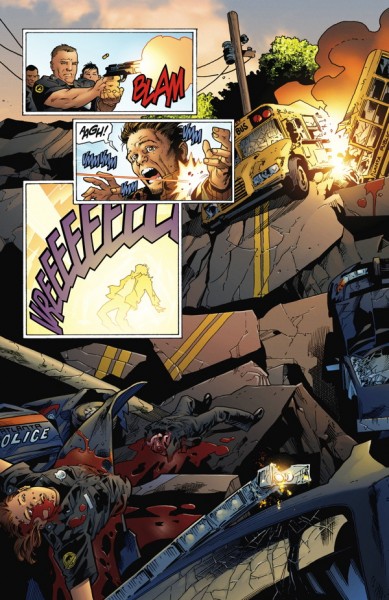
Me: Are you planning on continuing Bloodhound again after the mini-series is over in the future?
Jolley: Yes, in one way or another. I'm a novelist as well as a comic book writer, so I might see how
Bloodhound feels as prose. I haven't decided yet.
Me: Bloodhound was originally published by DC Comics but it is being collected as a trade paperback by Dark Hose Comics. Why?
Jolley: Bloodhound came out from DC at probably the worst possible time for it. As I mentioned earlier, it was not a story about capes and codenames, but DC put it on the shelves right smack in the middle of
Identity Crisis, a huge cross-company event that was only about capes and codenames. So it never found an audience.
I got the rights reverted, sometime around 2007, I think, and I really wanted to do more with it as a comic book, so I waited until the right opportunity came along. Dark Horse loved the material, allowed me to retain 100% ownership, and was able to hire back the entire creative team (the brilliant lineup of Leonard Kirk on pencils, Robin Riggs on inks, Moose Baumann on colors, and Rob Leigh on letters). It felt like the perfect setup to reintroduce the world to Clev and Saffron, so I went for it.
Me: Also, the collected edition does not include Bloodhound #5. Why is that? Will it affect how the story is perceived by readers?
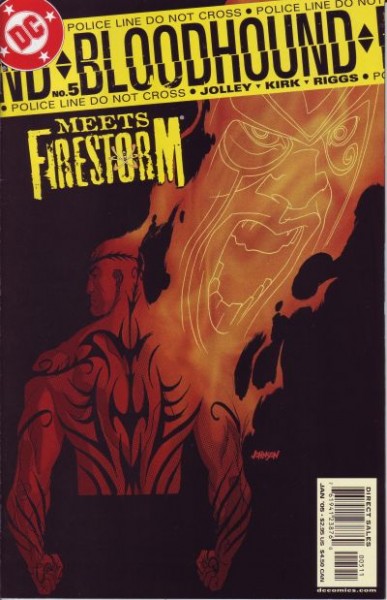
Jolley: Yeah,
Bloodhound 5 was part of a crossover with the other DC title I was writing at the time, Firestorm. It wasn't my idea to do the crossover, so I wrote it in a way that it could just be excised from the larger story and no one would notice. When Bloodhound went to Dark Horse, we couldn't use any "DC elements," so an issue co-starring a well-known, visually distinctive DC character was right out; but because I had planned it to be removable, no one reading the paperback will miss it.
Me: Can you tell us about the other Dark Horse series you are writing, Terminator: Enemy of my Enemy and how it differs from the Terminator movies?
Jolley: Enemy of my Enemy takes the
Terminator franchise back to its roots, by which I mean it's set entirely in 1985, a year after the events of the first film. Thinking about what kind of Terminator story I wanted to tell, and especially going back and watching the first movie again, I really wanted to tap into the horror that the original film used. It was an action movie, definitely, but there was some serious fear of the unknown involved; for a good chunk of the movie, Sarah Connor had no idea what the Terminator was. All she knew was that he was a huge, terrifying guy who wanted to kill her, and who appeared to be impervious to damage, and in that respect he had a lot in common with Michael Myers from
Halloween. So
Enemy of my Enemy is about what happens when Skynet sends a Terminator back to kill someone, except that this time the Resistance isn't able to send a soldier. There's no Kyle Reese analog. So it's purely humans-vs-Terminator, with basically no understanding of where the Terminator came from and what his nature is.
The protagonist of the story is an ex-CIA assassin named Farrow Greene, who I described in the script as being a cross between Gina Torres and Gina Carano. She's got a price on her head, and she hopes to pay off her own bounty by taking a job for a pharmaceutical corporation, locating and delivering a fugitive scientist named Elise Fong. Fong's research hasn't just made her a target for the guys in suits, though; her work developing artificial skin causes Skynet to send a Terminator after her. So Greene and the Terminator both want Fong, and when a third party gets involved, it creates a dynamic that I don't think we've seen before inTerminator stories. I'm really excited about it.
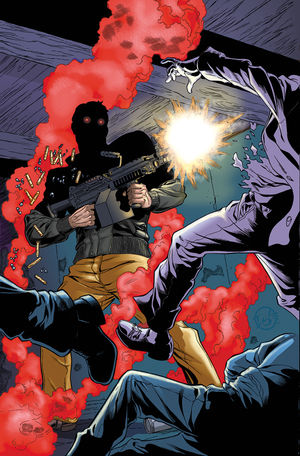
Me: A lot of people look fondly on the Terminator films. What has your experience with them been like and how did you get the job writing the comic book?
Jolley: Like just about every other sci-fi fan, I loved the original movie and
Terminator 2. My enjoyment of the franchise began to go down with each movie after that, but the first two films mean a lot to me. As far as how I got the job, I had just finished up the last script for Crowbar Medicine, and when it came time for Dark Horse to pick a writer for this new Terminator mini, they basically looked around and said, "Who do we have who does really well writing large men who destroy things with their bare hands?
...Dan Jolley."
Me: Not only did you write the Prototype 2 comic book, you were also the person who wrote the story for the video game. What was that experience like?
Jolley: Well, I can't say I was the one who wrote the story; I helped develop the story, and I was Lead Writer on the game, but video game writing is intensely collaborative—not just with the other people on the team, but also with the actual technology of the game. Radical already had a lot of the gameplay done when I was brought on board, as well as some of the cut-scenes. So I contributed a lot of the ambient dialogue (things characters say in the game to make the world feel more alive, such as things you hear when you're just walking down the street, or things people scream when something bad happens), and I helped script the cut-scenes and shape the overall story. But I can't take anything like full credit, especially since Jeffrey Campbell, Radical's Narrative Director, did as much work on the cut-scenes as I did.
As far as what the experience was like, it was fantastic. I got to go up to Vancouver, Canada, to Radical's offices, for a handful of week-long story meetings. I'd sit around a big conference table with about ten other people from various departments, and we'd hash out the story together. Then I'd go back home and do the nuts-and-bolts of the writing. I worked on
Prototype 2 for right at a year, I'd say.
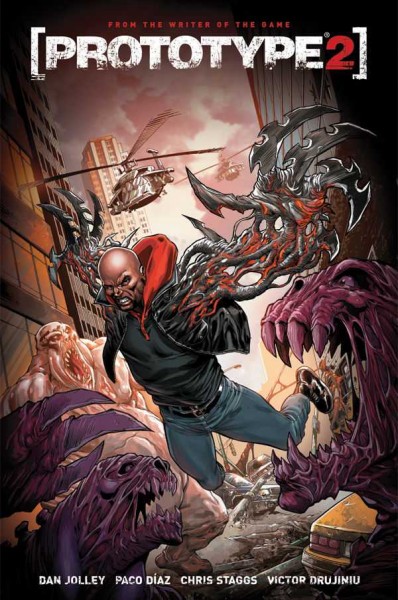
Me: How did you get the job writing the script for the video game and the comic book?
Jolley: I had already done a good bit of work for Activision, working on their
Transformers games, and because of that, I got picked to be lead writer on their
Spider-Man 4 tie-in game. When Sam Raimi and Sony called it quits and the movie got canceled, Radical needed to figure out what to do next, so they decided on a sequel to Prototype. They seemed to like the work I had already done on
Spider-Man, so they called me up and asked if I wanted to work on
Prototype 2.
When it came time to start promoting the game, one of the things they decided on was a series of digital comics that bridged the gap between Prototype and Prototype 2. I was the natural choice to write those, since I was Lead Writer and had lots of experience with comics. It was actually the Prototype 2 comics, which Dark Horse published, that opened the door for the
Bloodhound relaunch.
Me: If you could write the script for another video game and its comic book counterpart, what would it be?
Jolley: Oh, I've already got a
Bloodhound game pitch ready to go.
Me: Can you tell us about any future projects you are going to be writing?
Jolley: I wish I could, but non-disclosure agreements are serious things, so no, unfortunately, I can't.
Me: What inspirational words do you have for aspiring comic book writers?
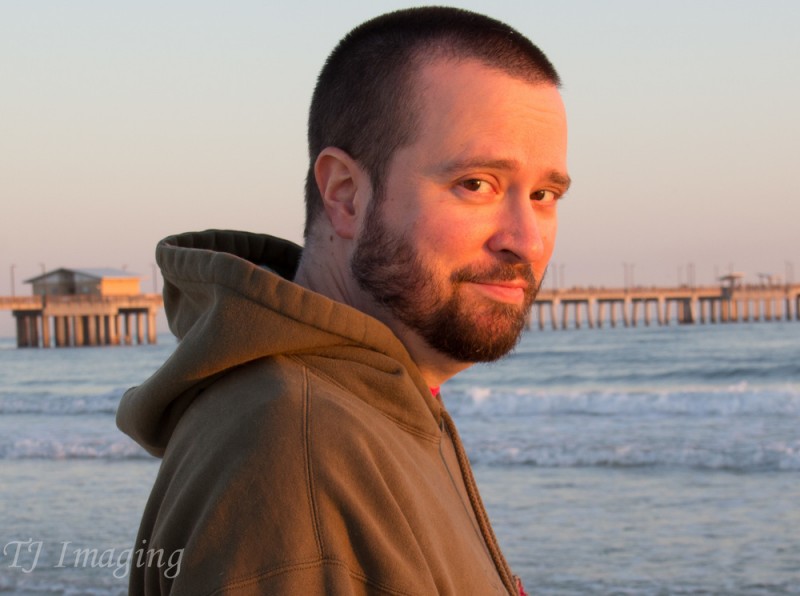
Jolley: I don't know about inspiration—I basically got where I am by being stubborn—but I do have a couple of pieces of advice. First, get your hands on a copy of
The Writer's Journey by Christopher Vogler, and then follow that up with Brian McDonald's
Invisible Ink and
The Golden Theme. Those books have been invaluable to me. And, if you want a really practical breakdown of the mechanics of writing comics scripts, I've got a series of pieces on my website explaining the process I use. Just go to
www.danjolley.com and look for posts called, "How to Write the Way I Write."
Me: Thanks for your time!
 Now, despite himself, Clev is getting truly attached to Trish and Rachel and Michelle—especially Michelle. He's still a huge, scarred, brute of a guy, and he still has to wear the tracking collar, so it's kind of a jarring sight, seeing him interact with what might be considered a normal family. But he's getting there.
The central conflict in Crowbar Medicine results from a superhuman who loses control of his powers and kills two dozen civilians, many of them children, in an Atlanta suburb. A scientist named Bradley Morgenstern decides that the average American can no longer protect himself; Morgenstern has developed a device he calls the Power Chip, which can grant people superhuman abilities. Morgenstern commandeers every broadcast channel and tells the country that he has made this device available to the American public, if you pass his background check. Clev absolutely loathes people with superhuman powers, and as soon as Morgenstern makes his nation-wide announcement, Clev knows things are going to go horribly wrong. As he puts it at the end of issue 1, "That's the sound of shit hitting the fan. All of it. Every last chunk." And he's right, as he and Saffron get swept up in the ensuing events.
And yes, for those wondering, this story does parallel the current national debate on gun control. It's not me preaching; there's no lecturing, either for or against guns. But the story does make a point. Who knows, maybe Wayne LaPierre or the Brady Campaign will decide to weigh in on it.
Me: Are you planning on continuing Bloodhound again after the mini-series is over in the future?
Jolley: Yes, in one way or another. I'm a novelist as well as a comic book writer, so I might see how Bloodhound feels as prose. I haven't decided yet.
Me: Bloodhound was originally published by DC Comics but it is being collected as a trade paperback by Dark Hose Comics. Why?
Jolley: Bloodhound came out from DC at probably the worst possible time for it. As I mentioned earlier, it was not a story about capes and codenames, but DC put it on the shelves right smack in the middle of Identity Crisis, a huge cross-company event that was only about capes and codenames. So it never found an audience.
I got the rights reverted, sometime around 2007, I think, and I really wanted to do more with it as a comic book, so I waited until the right opportunity came along. Dark Horse loved the material, allowed me to retain 100% ownership, and was able to hire back the entire creative team (the brilliant lineup of Leonard Kirk on pencils, Robin Riggs on inks, Moose Baumann on colors, and Rob Leigh on letters). It felt like the perfect setup to reintroduce the world to Clev and Saffron, so I went for it.
Me: Also, the collected edition does not include Bloodhound #5. Why is that? Will it affect how the story is perceived by readers?
Jolley: Yeah, Bloodhound 5 was part of a crossover with the other DC title I was writing at the time, Firestorm. It wasn't my idea to do the crossover, so I wrote it in a way that it could just be excised from the larger story and no one would notice. When Bloodhound went to Dark Horse, we couldn't use any "DC elements," so an issue co-starring a well-known, visually distinctive DC character was right out; but because I had planned it to be removable, no one reading the paperback will miss it.
Me: Can you tell us about the other Dark Horse series you are writing, Terminator: Enemy of my Enemy and how it differs from the Terminator movies?
Jolley: Enemy of my Enemy takes the Terminator franchise back to its roots, by which I mean it's set entirely in 1985, a year after the events of the first film. Thinking about what kind of Terminator story I wanted to tell, and especially going back and watching the first movie again, I really wanted to tap into the horror that the original film used. It was an action movie, definitely, but there was some serious fear of the unknown involved; for a good chunk of the movie, Sarah Connor had no idea what the Terminator was. All she knew was that he was a huge, terrifying guy who wanted to kill her, and who appeared to be impervious to damage, and in that respect he had a lot in common with Michael Myers from Halloween. So Enemy of my Enemy is about what happens when Skynet sends a Terminator back to kill someone, except that this time the Resistance isn't able to send a soldier. There's no Kyle Reese analog. So it's purely humans-vs-Terminator, with basically no understanding of where the Terminator came from and what his nature is.
The protagonist of the story is an ex-CIA assassin named Farrow Greene, who I described in the script as being a cross between Gina Torres and Gina Carano. She's got a price on her head, and she hopes to pay off her own bounty by taking a job for a pharmaceutical corporation, locating and delivering a fugitive scientist named Elise Fong. Fong's research hasn't just made her a target for the guys in suits, though; her work developing artificial skin causes Skynet to send a Terminator after her. So Greene and the Terminator both want Fong, and when a third party gets involved, it creates a dynamic that I don't think we've seen before inTerminator stories. I'm really excited about it.
Me: A lot of people look fondly on the Terminator films. What has your experience with them been like and how did you get the job writing the comic book?
Jolley: Like just about every other sci-fi fan, I loved the original movie and Terminator 2. My enjoyment of the franchise began to go down with each movie after that, but the first two films mean a lot to me. As far as how I got the job, I had just finished up the last script for Crowbar Medicine, and when it came time for Dark Horse to pick a writer for this new Terminator mini, they basically looked around and said, "Who do we have who does really well writing large men who destroy things with their bare hands? ...Dan Jolley."
Me: Not only did you write the Prototype 2 comic book, you were also the person who wrote the story for the video game. What was that experience like?
Jolley: Well, I can't say I was the one who wrote the story; I helped develop the story, and I was Lead Writer on the game, but video game writing is intensely collaborative—not just with the other people on the team, but also with the actual technology of the game. Radical already had a lot of the gameplay done when I was brought on board, as well as some of the cut-scenes. So I contributed a lot of the ambient dialogue (things characters say in the game to make the world feel more alive, such as things you hear when you're just walking down the street, or things people scream when something bad happens), and I helped script the cut-scenes and shape the overall story. But I can't take anything like full credit, especially since Jeffrey Campbell, Radical's Narrative Director, did as much work on the cut-scenes as I did.
As far as what the experience was like, it was fantastic. I got to go up to Vancouver, Canada, to Radical's offices, for a handful of week-long story meetings. I'd sit around a big conference table with about ten other people from various departments, and we'd hash out the story together. Then I'd go back home and do the nuts-and-bolts of the writing. I worked on Prototype 2 for right at a year, I'd say.
Me: How did you get the job writing the script for the video game and the comic book?
Jolley: I had already done a good bit of work for Activision, working on their Transformers games, and because of that, I got picked to be lead writer on their Spider-Man 4 tie-in game. When Sam Raimi and Sony called it quits and the movie got canceled, Radical needed to figure out what to do next, so they decided on a sequel to Prototype. They seemed to like the work I had already done on Spider-Man, so they called me up and asked if I wanted to work on Prototype 2.
When it came time to start promoting the game, one of the things they decided on was a series of digital comics that bridged the gap between Prototype and Prototype 2. I was the natural choice to write those, since I was Lead Writer and had lots of experience with comics. It was actually the Prototype 2 comics, which Dark Horse published, that opened the door for the Bloodhound relaunch.
Me: If you could write the script for another video game and its comic book counterpart, what would it be?
Jolley: Oh, I've already got a Bloodhound game pitch ready to go.
Me: Can you tell us about any future projects you are going to be writing?
Jolley: I wish I could, but non-disclosure agreements are serious things, so no, unfortunately, I can't.
Me: What inspirational words do you have for aspiring comic book writers?
Jolley: I don't know about inspiration—I basically got where I am by being stubborn—but I do have a couple of pieces of advice. First, get your hands on a copy of The Writer's Journey by Christopher Vogler, and then follow that up with Brian McDonald's Invisible Ink and The Golden Theme. Those books have been invaluable to me. And, if you want a really practical breakdown of the mechanics of writing comics scripts, I've got a series of pieces on my website explaining the process I use. Just go to www.danjolley.com and look for posts called, "How to Write the Way I Write."
Me: Thanks for your time!
Now, despite himself, Clev is getting truly attached to Trish and Rachel and Michelle—especially Michelle. He's still a huge, scarred, brute of a guy, and he still has to wear the tracking collar, so it's kind of a jarring sight, seeing him interact with what might be considered a normal family. But he's getting there.
The central conflict in Crowbar Medicine results from a superhuman who loses control of his powers and kills two dozen civilians, many of them children, in an Atlanta suburb. A scientist named Bradley Morgenstern decides that the average American can no longer protect himself; Morgenstern has developed a device he calls the Power Chip, which can grant people superhuman abilities. Morgenstern commandeers every broadcast channel and tells the country that he has made this device available to the American public, if you pass his background check. Clev absolutely loathes people with superhuman powers, and as soon as Morgenstern makes his nation-wide announcement, Clev knows things are going to go horribly wrong. As he puts it at the end of issue 1, "That's the sound of shit hitting the fan. All of it. Every last chunk." And he's right, as he and Saffron get swept up in the ensuing events.
And yes, for those wondering, this story does parallel the current national debate on gun control. It's not me preaching; there's no lecturing, either for or against guns. But the story does make a point. Who knows, maybe Wayne LaPierre or the Brady Campaign will decide to weigh in on it.
Me: Are you planning on continuing Bloodhound again after the mini-series is over in the future?
Jolley: Yes, in one way or another. I'm a novelist as well as a comic book writer, so I might see how Bloodhound feels as prose. I haven't decided yet.
Me: Bloodhound was originally published by DC Comics but it is being collected as a trade paperback by Dark Hose Comics. Why?
Jolley: Bloodhound came out from DC at probably the worst possible time for it. As I mentioned earlier, it was not a story about capes and codenames, but DC put it on the shelves right smack in the middle of Identity Crisis, a huge cross-company event that was only about capes and codenames. So it never found an audience.
I got the rights reverted, sometime around 2007, I think, and I really wanted to do more with it as a comic book, so I waited until the right opportunity came along. Dark Horse loved the material, allowed me to retain 100% ownership, and was able to hire back the entire creative team (the brilliant lineup of Leonard Kirk on pencils, Robin Riggs on inks, Moose Baumann on colors, and Rob Leigh on letters). It felt like the perfect setup to reintroduce the world to Clev and Saffron, so I went for it.
Me: Also, the collected edition does not include Bloodhound #5. Why is that? Will it affect how the story is perceived by readers?
Jolley: Yeah, Bloodhound 5 was part of a crossover with the other DC title I was writing at the time, Firestorm. It wasn't my idea to do the crossover, so I wrote it in a way that it could just be excised from the larger story and no one would notice. When Bloodhound went to Dark Horse, we couldn't use any "DC elements," so an issue co-starring a well-known, visually distinctive DC character was right out; but because I had planned it to be removable, no one reading the paperback will miss it.
Me: Can you tell us about the other Dark Horse series you are writing, Terminator: Enemy of my Enemy and how it differs from the Terminator movies?
Jolley: Enemy of my Enemy takes the Terminator franchise back to its roots, by which I mean it's set entirely in 1985, a year after the events of the first film. Thinking about what kind of Terminator story I wanted to tell, and especially going back and watching the first movie again, I really wanted to tap into the horror that the original film used. It was an action movie, definitely, but there was some serious fear of the unknown involved; for a good chunk of the movie, Sarah Connor had no idea what the Terminator was. All she knew was that he was a huge, terrifying guy who wanted to kill her, and who appeared to be impervious to damage, and in that respect he had a lot in common with Michael Myers from Halloween. So Enemy of my Enemy is about what happens when Skynet sends a Terminator back to kill someone, except that this time the Resistance isn't able to send a soldier. There's no Kyle Reese analog. So it's purely humans-vs-Terminator, with basically no understanding of where the Terminator came from and what his nature is.
The protagonist of the story is an ex-CIA assassin named Farrow Greene, who I described in the script as being a cross between Gina Torres and Gina Carano. She's got a price on her head, and she hopes to pay off her own bounty by taking a job for a pharmaceutical corporation, locating and delivering a fugitive scientist named Elise Fong. Fong's research hasn't just made her a target for the guys in suits, though; her work developing artificial skin causes Skynet to send a Terminator after her. So Greene and the Terminator both want Fong, and when a third party gets involved, it creates a dynamic that I don't think we've seen before inTerminator stories. I'm really excited about it.
Me: A lot of people look fondly on the Terminator films. What has your experience with them been like and how did you get the job writing the comic book?
Jolley: Like just about every other sci-fi fan, I loved the original movie and Terminator 2. My enjoyment of the franchise began to go down with each movie after that, but the first two films mean a lot to me. As far as how I got the job, I had just finished up the last script for Crowbar Medicine, and when it came time for Dark Horse to pick a writer for this new Terminator mini, they basically looked around and said, "Who do we have who does really well writing large men who destroy things with their bare hands? ...Dan Jolley."
Me: Not only did you write the Prototype 2 comic book, you were also the person who wrote the story for the video game. What was that experience like?
Jolley: Well, I can't say I was the one who wrote the story; I helped develop the story, and I was Lead Writer on the game, but video game writing is intensely collaborative—not just with the other people on the team, but also with the actual technology of the game. Radical already had a lot of the gameplay done when I was brought on board, as well as some of the cut-scenes. So I contributed a lot of the ambient dialogue (things characters say in the game to make the world feel more alive, such as things you hear when you're just walking down the street, or things people scream when something bad happens), and I helped script the cut-scenes and shape the overall story. But I can't take anything like full credit, especially since Jeffrey Campbell, Radical's Narrative Director, did as much work on the cut-scenes as I did.
As far as what the experience was like, it was fantastic. I got to go up to Vancouver, Canada, to Radical's offices, for a handful of week-long story meetings. I'd sit around a big conference table with about ten other people from various departments, and we'd hash out the story together. Then I'd go back home and do the nuts-and-bolts of the writing. I worked on Prototype 2 for right at a year, I'd say.
Me: How did you get the job writing the script for the video game and the comic book?
Jolley: I had already done a good bit of work for Activision, working on their Transformers games, and because of that, I got picked to be lead writer on their Spider-Man 4 tie-in game. When Sam Raimi and Sony called it quits and the movie got canceled, Radical needed to figure out what to do next, so they decided on a sequel to Prototype. They seemed to like the work I had already done on Spider-Man, so they called me up and asked if I wanted to work on Prototype 2.
When it came time to start promoting the game, one of the things they decided on was a series of digital comics that bridged the gap between Prototype and Prototype 2. I was the natural choice to write those, since I was Lead Writer and had lots of experience with comics. It was actually the Prototype 2 comics, which Dark Horse published, that opened the door for the Bloodhound relaunch.
Me: If you could write the script for another video game and its comic book counterpart, what would it be?
Jolley: Oh, I've already got a Bloodhound game pitch ready to go.
Me: Can you tell us about any future projects you are going to be writing?
Jolley: I wish I could, but non-disclosure agreements are serious things, so no, unfortunately, I can't.
Me: What inspirational words do you have for aspiring comic book writers?
Jolley: I don't know about inspiration—I basically got where I am by being stubborn—but I do have a couple of pieces of advice. First, get your hands on a copy of The Writer's Journey by Christopher Vogler, and then follow that up with Brian McDonald's Invisible Ink and The Golden Theme. Those books have been invaluable to me. And, if you want a really practical breakdown of the mechanics of writing comics scripts, I've got a series of pieces on my website explaining the process I use. Just go to www.danjolley.com and look for posts called, "How to Write the Way I Write."
Me: Thanks for your time!